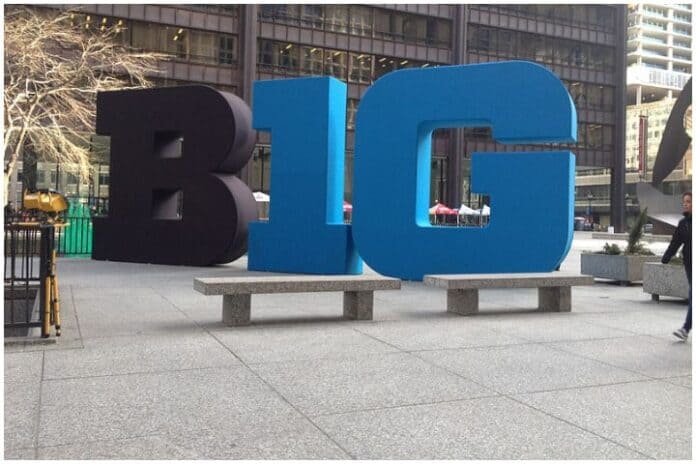(The Center Square) – COVID-19 isn’t stopping Big Ten football.
After punting on the season in August and receiving backlash from coaches, players, and Midwest Republican lawmakers, teams will kick off on Oct. 23.
The Big Ten Council of Presidents and Chancellors (COP/C) voted unanimously to resume the football season after adopting medical protocols such as daily antigen testing for student-athletes, coaches, trainers, and other individuals; enhanced cardiac screening; and a data-driven testing approach to continue playing.
Test results must be recorded before each practice or game.
“Everyone associated with the Big Ten should be very proud of the groundbreaking steps that are now being taken to better protect the health and safety of the student-athletes and surrounding communities,” Dr. Jim Borchers, Ohio State University Head Team Physician, said in a statement.
“The data we are going to collect from testing and the cardiac registry will provide major contributions for all 14 Big Ten institutions as they study COVID-19 and attempt to mitigate the spread of the disease among wider communities.”
Team test positivity rate and population positivity rate thresholds will determine recommendations for continued competition.
COVID-19 positive student-athletes must receive clearance from a cardiologist and wait at least 21 days to return to competition after a positive diagnosis.
The 14 Big Ten institutions will start a cardiac registry to study the effects on COVID-19 positive student-athletes.
“From the onset of the pandemic, our highest priority has been the health and the safety of our students. The new medical protocols and standards put into place by the Big Ten Return To Competition Task Force were pivotal in the decision to move forward with sports in the conference,” Morton Schapiro, Chair of the Big Ten Council of Presidents/Chancellors and Northwestern University President, said in a statement.
The Big Ten Conference will use data provided by each Chief Infection Officer to decide whether to continue playing based on the team’s seven-day rolling average of positivity rate and population positivity rate.
“Our focus with the Task Force over the last six weeks was to ensure the health and safety of our student-athletes. Our goal has always been to return to competition so all student-athletes can realize their dream of competing in the sports they love,” Big Ten Commissioner Kevin Warren said in a statement.
“We are incredibly grateful for the collaborative work that our Return to Competition Task Force have accomplished to ensure the health, safety and wellness of student-athletes, coaches and administrators.”
Daily testing will begin by Sept. 30.
Michigan State officials previously estimated a canceled season would cost at least $85 million and result in “severe cuts” within the athletic department, mostly funded by football.
A Forbes report ranked the University of Michigan as the third most valuable team in 2019, with a three-year average revenue of $147 million.
Michigan State took the 22nd spot, with the Spartans seizing a three-year average revenue of $87 million.
A 2007 study from the Anderson Economic Group estimated that the economic impact of Big Ten football games in Michigan is more than $177 million.
By Scott McClallen | The Center Square
Go to Source
Reposted with permission











![WATCH: Elon Musk Town Hall Rally in Green Bay [FULL Video]](https://www.wisconsinrightnow.com/wp-content/uploads/2022/04/Elon_Musk_3018710552-356x220.jpg)



![The Wisconsin DOJ’s ‘Unlawful’ Lawman [WRN Voices] josh kaul](https://www.wisconsinrightnow.com/wp-content/uploads/2025/03/MixCollage-29-Mar-2025-08-48-PM-2468-356x220.jpg)







![Phil Gramm’s Letter to Wall Street Journal [Up Against the Wall]](https://www.wisconsinrightnow.com/wp-content/uploads/2025/03/gramm-356x220.png)










